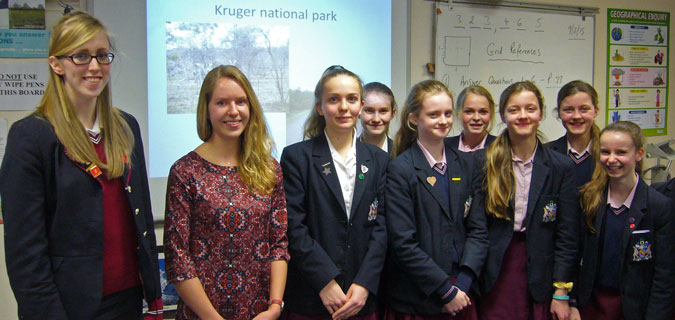Emily Beckett, former HMSG student
HMSG’s Geographical Society welcomed Emily Becket a former A Level HMSG geography student. Emily has recently returned from a three month project in South Africa during her university gap year.

Emily travelled to South Africa with ‘The Leap’ a gap year company which offers placements which combine multiple locations and volunteering project opportunities. Emily stayed at Kwa Madwala, a private game reserve which is located along the southern border of the world famous Kruger National Park. Kwa Madwala is called a ‘Big 5’ reserve as it contains leopard, lion, buffalo, elephant and rhino.
Emily told the audience of 40 Year 9-13 students that she was drawn to this location because of its amazing wildlife but also the opportunity to work with horses. Emily is passionate about horses and has recently purchased an ex-race horse which she hopes to train for cross-country events. In Kwa Madwala Emily’s role was to help train young horses to ride near wildlife, including lions. This is obviously not in their nature. Her duties also included 30km fence patrols to check for wildlife damage or poaching activity. She also found time to volunteer at a local orphanage, teaching and cooking for Aids orphans. HIV/AIDs is a significant problem in Southern Africa and has resulted in large number of orphans. Emily’s wildlife conservation duties included anti-poaching patrols and the removal of invasive plant species. These linked closely with her A Level Geography course which included a topic on biodiversity at risk.
There are some extremely valuable and endangered species in this area of South Africa including the African Wild Dog and the Black Rhino. Emily went on to explain to the audience there are many levels of poaching from local communities hunting for food, to cultural/religious poaching, e.g. obtaining the heart of a lion, to syndicates which are solely interested in the financial gain from endangered species. Emily explained that many rhino horns are illegally smuggled to Asia where they are used in medicinal treatments although there is no scientific evidence that these treatments have any benefit. Local poachers may receive £2000 for a horn which is an area of low wages and high unemployment is a major draw. The real money, however, is made by people processing and trading horns, which can go for £30,000 and above. Emily encouraged the girls to investigate the work of charity groups like Save the Rhino who are activity ‘de-horning’ rhinos and adding arsenic (not toxic to the rhinos) to horns to discourage poaching.
Towards the end of her time in South Africa Emily headed off to neighboring Mozambique for some well-earned R&R: beaches, abseiling and white water rafting. She showed the audience images from her time in Mozambique and explained how surprised she was that within a few miles of the border the roads deteriorated into mud tracks and extreme poverty became more apparent.
At the end of the talk Emily kindly answered several questions from students and also provided advice on choosing A Levels, university courses and gap years.
We are all very grateful to Emily for visiting us and giving such an interesting and informative talk. We wish her the very best with her future plans and with her Geography degree course at Exeter University.
Mr N. Meek
Head of Geography
